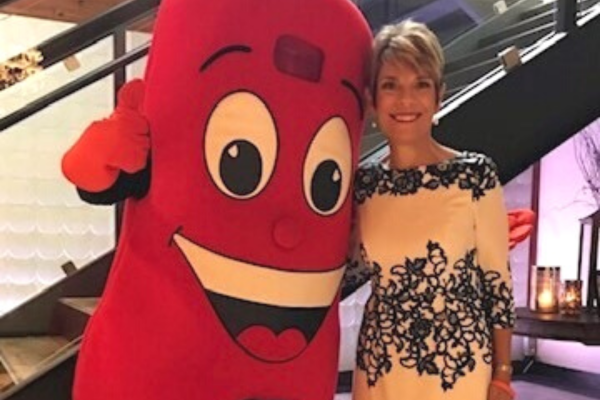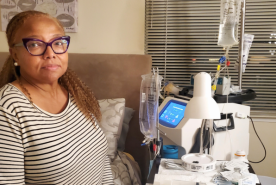August 31, 2023
After living with unmedicated bipolar disorder, characterized by periods of extreme emotional highs and lows, Shannon Glynn was thrilled when a doctor prescribed lithium to her. This medication could significantly improve her quality of life but there was a catch–it could also cause kidney damage or even kidney failure.
Shannon's kidney failure diagnosis
“I had experienced ups and downs for years before receiving my bipolar diagnosis. The doctor told me lithium would help stabilize my mood,” Shannon said. “They also said it could ruin my kidneys–but I desperately needed the medication and started taking it in 1979.”
Shannon had great success with this treatment for almost thirty years. Throughout that time, her doctors monitored her kidney function to ensure the medication wasn’t harming her kidneys.
"In 2008, my doctor noticed my creatinine levels suddenly increased and sent me to a nephrologist," said Shannon. "It was too late to save my kidneys, though. When I got the news, I was driving and almost drove into oncoming traffic. I thought there would be time to save my kidney function but they failed so quickly."
With that, Shannon needed to decide if she wanted to do in-center hemodialysis or peritoneal dialysis (PD).
"I wanted PD so I spoke with a woman on that modality before letting the doctor know. That conversation affirmed it was the right decision for me," Shannon said. "I started PD in October and feel really lucky I didn't need to do in-center dialysis three days a week."
Do you need a kidney transplant? Take "First Steps to Transplant" for the tools and resources needed to start your transplant journey.
Friends step up
Shannon did not have to stay on dialysis for long. Fifteen friends and family members stepped up as potential donors and several were a match.
"I never asked people to get tested. They just offered. A bunch were disqualified for various reasons like high blood pressure or age," said Shannon. "A few who weren't chosen asked me to think of them if I ever needed another kidney in the future."
Seven months after starting dialysis, Shannon's good friend Molly was chosen as her kidney donor.
"The surgery went well. My kidneys started working immediately–my surgeon said I started peeing within moments. My donor was out of the hospital in four days with no complications," Shannon said. "They took me off lithium and put me on a new medication. There is a chance that it could cause liver failure, but my doctors are very diligent in monitoring that. I'm blessed because the immunosuppressant drugs don't affect this new medication.”
Shannon's new kidney has been functioning for more than 14 years with only one complication: low hemoglobin, meaning her body doesn't always make enough red blood cells.
"My red blood cell count can get very low but I give myself a shot and it gets better. Now I only get worried when my doctors are worried," said Shannon. "I feel so lucky that this is the only issue I’ve faced after my transplant surgery.”
Are you interested in learning more about living donation? Take "Becoming a Living Donor," our free online course designed to teach you everything about living kidney donation.
Giving back to the kidney community
After receiving such a life-changing gift, Shannon knew she wanted to give back.
"I'd spoken with a transplant recipient about transplantation before I had my surgery. We got coffee and I learned his story–he’d been involved at my local National Kidney Foundation office since a fraternity brother gave him a kidney many years back," Shannon said. "After that discussion, I met with the NKF team and went to my first Kidney Walk while I was on dialysis. After the transplant, I knew I wanted to continue working with them."
Since then, Shannon has participated in NKF Galas and many Kidney Walks with her team, 'You've Gotta Be Kidneying Me.' She is also a dedicated Voices for Kidney Health Advocate, fighting for important kidney legislation in her state, Minnesota.
"It's been amazing. The governor signed the Living Donor Protection Act last year and the indefinite coverage of immunosuppressive drugs for kidney transplant recipients passed [in Congress in late 2020]. Seeing that change can happen with hard work is heartening. I've advocated during the Kidney Patient Summit in Washington D.C. and I'm the Vice Chair of my district's Kidney Advocacy Committee,” Shannon said. “I’ve been blessed. I was only on dialysis for seven months before receiving a transplant. Most people don’t get that lucky, so I will help how I can. To those with kidney disease feeling isolated and worried, reach out to the National Kidney Foundation. They will help."
Do you want to make a difference like Shannon? Sign up to become a Voices for Kidney Health Advocate.


















